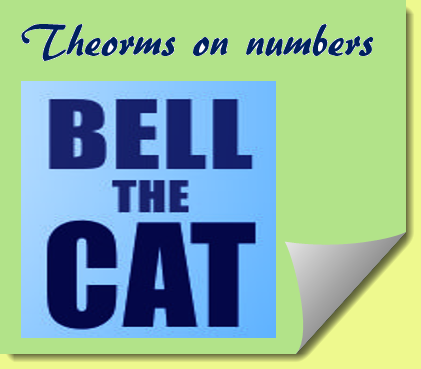
Theory of Numbers:
(1) Every number is of one of the forms, 5n, 5n ± 1, 5n ± 2.
(2) Every square number is of one of the forms 5n, 5n ± 1.
(3) The square of every odd number is of the form 8n + 1.
(4) Sum on 'n' consucutive number is always divisible by 'n' if 'n' is odd and sum of 'n' consecutive numbers is never divisible by 'n' if 'n' is even.
(5) Every perfect cube number is one of the three forms ; 9x -1, 9x or 9x + 1
Theorems on Division:
(1) If both ‘a’ and ‘b’ are divisible by ‘c’, so also is ma ± nb.
(2) If ‘r’ is the remainder when ‘a’ is divided by ‘b’ , then ‘cr’ is the remainder when ‘ca’ is divided by ‘cb’.
(3) If both ‘a’ and ‘b’ are divisible by ‘c’ and ‘r’ is the remainder when ‘a’ is divided by ‘b’ then
(i) ‘r’ is divisible by ‘c’ and
(ii) ‘r/c’ is the remainder when ‘a/c’ is divided by ‘b/c’.
Theorems on the Greatest Common Divisor:
(1) If ‘r’ is the remainder when ‘a’ is divided by ‘b’, the common divisors of ‘a’ and ‘b’ are the same as those of ‘b’ and ‘r’.
(2) If ‘a’ and ‘b’ are any two numbers, there exists a number ‘g’, and one only such that the common divisors of ‘a’ and ‘b’ are the same as the divisors of ‘g’.
(3) If ‘a’ and ‘b’ are each multiplied by any number ‘m’ or are divided by a common divisor ‘m’, then ‘g’, the greatest common divisor of ‘a’ and ‘b’, is multiplied or divided by ‘m’.
Numbers Prime to Each Other:
(1) If the product ‘ab’ is divisible by a number ‘m’, and ‘m’ is prime to one factor ‘a’, then ‘m’ is a divisor of the other factor ‘b’.
(2) If ‘a’ is prime to ‘b’, and each of these numbers is a divisor of N, then ‘ab’ is a divisor of N.
(3) If ‘a’ is prime to ‘b’, positive integers z, y can be found such that ax-by = ± 1.
Theorems on Prime Numbers:
(1) A prime number, ‘p’, is prime to every number which is not a multiple of ‘p’.
(2) If a prime ‘p’ is a divisor of a product ‘abcd … hk’, it is a divisor of at least one of the factor ‘a, b, ….. k’.
(3) Every prime number is in the form of 6k ± 1 except 2 and 3.
Theorems on Numbers, Prime or Composite:
(1) Every composite number N has at least one prime divisor.
(2) A composite number can be expressed as the product of prime factors in one way only.
(3) If m is prime to each of the numbers, a, b, …, k, it is prime to the product ab …. k.
(4) If ‘a’ is prime to ‘b’, then ‘an’ is prime to ‘bn’, where ‘n’ is any integer l and conversely.
(5) The sequence of primes is endless.
Theorems:
(1) The product of any ‘n’ consecutive integers is divisible by n !.
(2) If ‘n’ is a prime, n C r is divisible by n.
Fermat’s Theorem:
· If p is a prime and a is any number prime to p, then a p-1 -1 is divisible by p.
Corollary 1:
· If p is a prime and a is any number whatever, then ap-a is divisible by p.
· The fifth power of any number N has the same right-hand digit as N.
Wilson’s Theorem:
· If p is a prime number, then (p-1) ! +1 is divisible by p.
Lagrange’s Theorem:
· If p is a prime and r is any number less than p – 1, the sum of the products of the numbers 1, 2, 3, …., p – 1 taken r together is divisible by p.